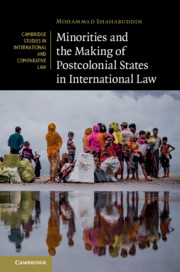Book contents
- Minorities and the Making of Postcolonial States in International Law
- Cambridge Studies in International and Comparative Law: 154
- Minorities and the Making of Postcolonial States in International Law
- Copyright page
- Dedication
- Contents
- Foreword
- Acknowledgements
- Table of Cases
- Abbreviations
- Introduction
- Part I Ethno-nationalism and the Ideology of the Postcolonial State
- 1 Geneses of Ethno-nationalism in Postcolonial States
- 2 Minorities and the ‘Ideology’ of the Postcolonial State
- Part II International Law and the Postcolonial State
- Bibliography
- Index
- Cambridge Studies in International and Comparative Law
2 - Minorities and the ‘Ideology’ of the Postcolonial State
from Part I - Ethno-nationalism and the Ideology of the Postcolonial State
Published online by Cambridge University Press: 21 May 2021
- Minorities and the Making of Postcolonial States in International Law
- Cambridge Studies in International and Comparative Law: 154
- Minorities and the Making of Postcolonial States in International Law
- Copyright page
- Dedication
- Contents
- Foreword
- Acknowledgements
- Table of Cases
- Abbreviations
- Introduction
- Part I Ethno-nationalism and the Ideology of the Postcolonial State
- 1 Geneses of Ethno-nationalism in Postcolonial States
- 2 Minorities and the ‘Ideology’ of the Postcolonial State
- Part II International Law and the Postcolonial State
- Bibliography
- Index
- Cambridge Studies in International and Comparative Law
Summary
Chapter two examines how postcolonial states respond to ethno-nationalism in general and minorities in particular. I argue that nationalist ruling elites conceive of the postcolonial state itself as an ‘ideology’, claiming that the unified national state, its liberal constitutional structure, and the developmental agenda will end the troublesome ethnic parochialism and, therefore, solve the problem of minorities. The ideological making of the postcolonial state not only obscures and glosses over the real reasons for the problem, but also shift attention to issues that help maintain asymmetric power relations. To substantiate this argument, I first explain John Thompson’s notion of ‘ideology’ as a set of ways in which ideas and meanings help create and sustain relations of domination. I then develop my argument that the ideology of the postcolonial state functions in three different forms: the postcolonial ‘national’, ‘liberal’, and ‘developmental’ state. Working through these three ideologies, the postcolonial state demands the submission of the minority cause to the greater ‘national’, ‘liberal’, and ‘developmental’ interests of the state, thereby legitimising the oppression of minorities. I demonstrate these ideological functions of the postcolonial state with historical examples: the discourse used in Indian Constituency Assembly debates to discuss minority rights.
Keywords
- Type
- Chapter
- Information
- Publisher: Cambridge University PressPrint publication year: 2021

